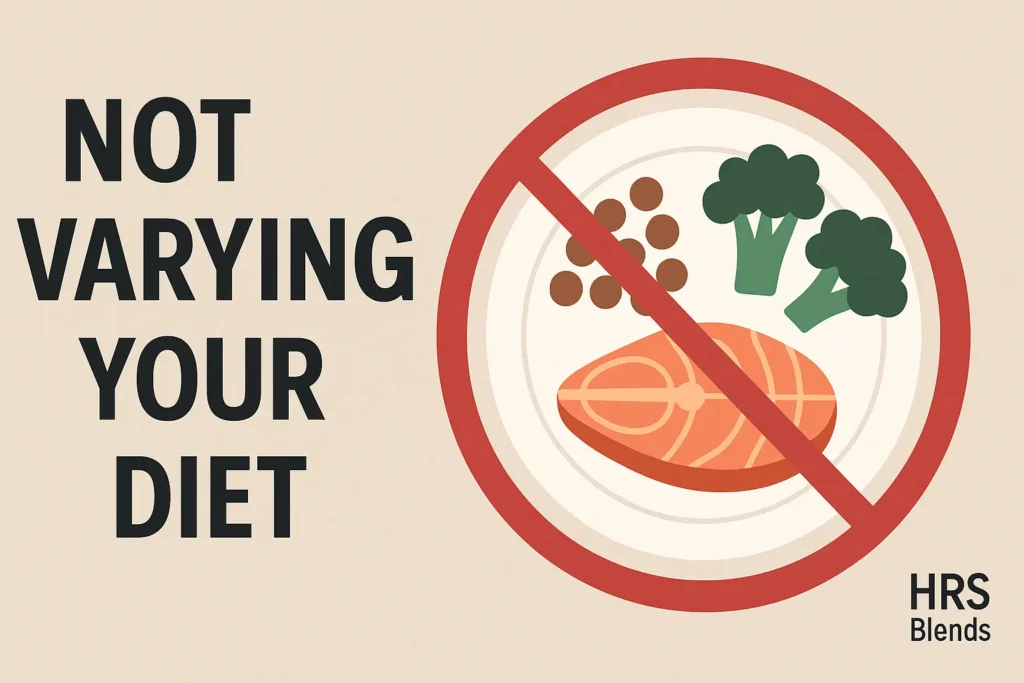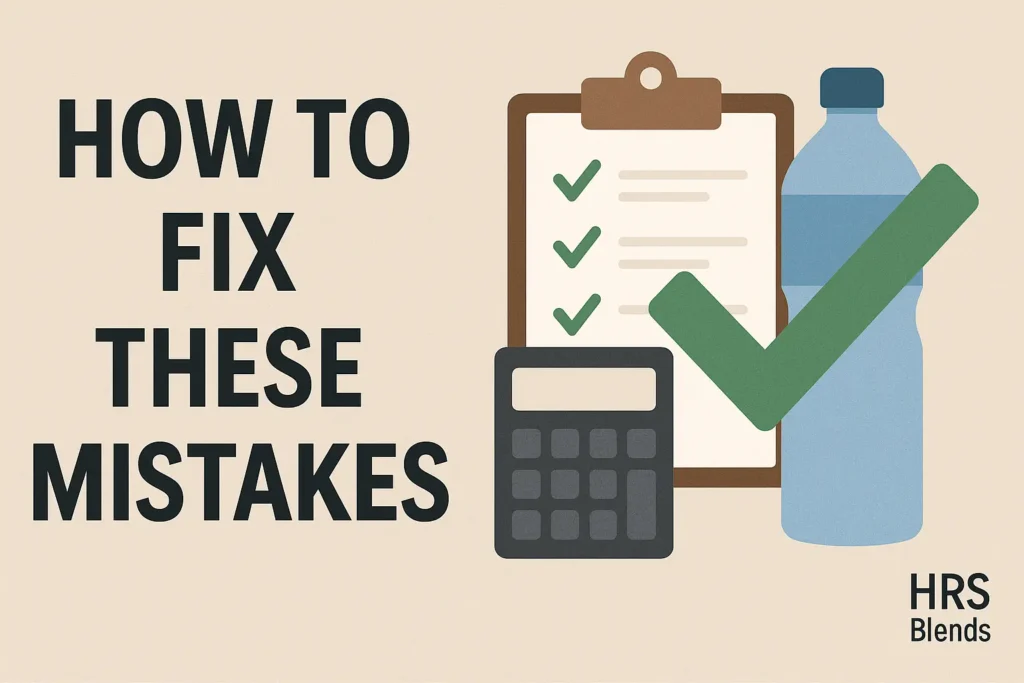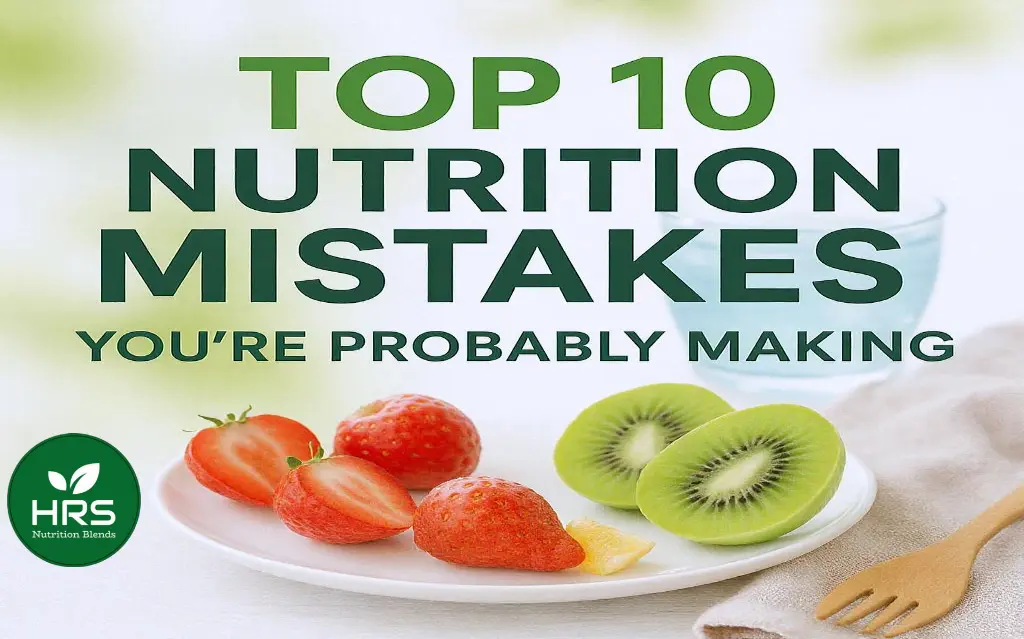Introduction
Have you been putting effort into eating healthy but still feel tired or see no progress? You might be falling into common nutrition mistakes without realizing it. This comprehensive guide uncovers the top 10 nutrition mistakes that could be sabotaging your health goals. From skipping meals to misunderstanding portion sizes, these errors are more common than you think. We’ll break them down with practical, easy-to-follow advice to help you avoid these pitfalls and build a better diet.
Nutrition is the foundation of a vibrant life, fueling your body and mind. However, myths and busy lifestyles often lead to nutrition mistakes that undo your hard work. Drawing insights from our previous posts, like the macronutrient guide, this listicle-style article aims to engage you with actionable tips. Whether you’re new to healthy eating or refining your habits, let’s dive into these mistakes and learn how to fix them!
The Top 10 Nutrition Mistakes
1. Skipping Breakfast
One of the most frequent nutrition mistakes is skipping breakfast to save time or cut calories. This habit can throw off your energy levels and lead to overeating later in the day. Breakfast kickstarts your metabolism and provides essential nutrients to power your morning. Instead of skipping, try a quick option like oatmeal with fruit or a smoothie. Our daily nutrition guide emphasizes the importance of this meal for sustained energy. Make it a habit to eat within an hour of waking to avoid this common nutrition mistake.
2. Overloading on Protein
While protein is crucial for muscle repair, overdoing it is a nutrition mistake that can harm your kidneys over time. Many assume more protein means better results, but the body can only use so much—excess is stored as fat or excreted. Aim for 0.8–1.2 grams per kilogram of body weight, as outlined in our macronutrient guide. Balance it with carbohydrates and healthy fats for a well-rounded diet. Use our BMR Calculator to find your ideal intake and avoid this nutrition mistake.
3. Avoiding Healthy Fats
A widespread nutrition mistake is avoiding all fats, fearing weight gain. Healthy fats from sources like nuts, olive oil, and avocados are vital for brain health, hormone production, and nutrient absorption. Cutting them out can lead to deficiencies and low energy. Incorporate a tablespoon of ghee in your dal or a handful of almonds as a snack. Learn more about fats in our past posts to steer clear of this nutrition mistake and boost your overall health.
4. Eating Too Many Processed Foods
Relying on processed foods like chips or packaged snacks is a major nutrition mistake. These are loaded with sugar, trans fats, and sodium, offering little nutritional value. Over time, this habit increases the risk of obesity and heart issues. Swap them for whole foods like roasted chickpeas or fresh fruit. Avoiding this nutrition mistake starts with reading labels and choosing natural options, a skill you can refine with our future guide on how to read nutrition labels.
5. Not Drinking Enough Water
Dehydration is a subtle yet common nutrition mistake that affects focus and digestion. Many don’t drink enough water, mistaking thirst for hunger. Aim for 2-3 liters daily, adjusting for activity level. Carry a water bottle as a reminder. This nutrition mistake can be avoided with consistent hydration, and our upcoming post on hydration importance will dive deeper into its benefits.
6. Ignoring Portion Sizes
Even healthy foods can lead to weight gain if portions are ignored—a frequent nutrition mistake. Eating too much rice or nuts without measuring can exceed your calorie needs. Use a food scale or visual cues, like a fist-sized portion of carbs. Our Nutrition Checklist helps track this. Avoiding this nutrition mistake ensures you enjoy your meals without overdoing it.
7. Skipping Meals
Skipping meals to save time or lose weight is a nutrition mistake that backfires. It slows your metabolism and leads to cravings. Regular eating, as explained in our meal timing guide, supports energy and digestion. Plan small, balanced meals instead to avoid this common nutrition mistake and maintain steady energy levels.
8. Relying on Supplements Too Much
Over-relying on supplements is a nutrition mistake that skips the benefits of whole foods. While they can help, they’re not a substitute for a balanced diet rich in vitamins and minerals. Get nutrients from fruits, veggies, and grains first. Our micronutrient guide shows how to do this naturally, helping you avoid this nutrition mistake.
9. Eating Too Fast
Rushing through meals is a nutrition mistake that hinders digestion and leads to overeating. When you eat quickly, your brain doesn’t register fullness, causing you to consume more than needed. Take 20-30 minutes per meal, chewing slowly. Our balanced plate guide encourages mindful eating to avoid this nutrition mistake and improve satisfaction.
10. Not Varying Your Diet
Eating the same foods daily is a nutrition mistake that limits nutrient diversity. Repetition can cause deficiencies in vitamins or minerals over time. Rotate proteins like lentils, chicken, and fish, and try different veggies. This nutrition mistake is easy to fix with variety, and our resources can guide you to a colorful plate!

How to Fix These Mistakes
Fixing nutrition mistakes doesn’t require a complete overhaul – just small, smart changes. Start by planning meals with a mix of macros, drinking water regularly, and eating slowly. Use our BMR Calculator to personalize your plan. Consistency is key to overcoming these nutrition mistakes and seeing real health benefits.
Expert advice from the Mayo Clinic supports these tips. Implement one change at a time, like adding a variety of veggies, to make it sustainable. This approach helps you avoid nutrition mistakes and build lasting habits.

Why These Mistakes Happen
Nutrition mistakes often stem from busy schedules, lack of knowledge, or following fad diets. People skip meals due to time constraints or avoid fats based on outdated advice. Misinformation online adds to the confusion, making it hard to separate fact from myth. This guide addresses these root causes, offering practical solutions to avoid nutrition mistakes and improve your diet.
For example, the myth that all carbs are bad leads to avoiding healthy sources like brown rice. Our meal timing guide helps debunk such errors with science-based timing tips.
Benefits of Avoiding These Mistakes
Avoiding nutrition mistakes brings a host of benefits. You’ll notice improved energy, better digestion, and easier weight management. Your immune system strengthens with a varied diet, and you’ll reduce the risk of chronic diseases. This proactive approach to avoiding nutrition mistakes enhances your overall quality of life.
Track your progress with our Nutrition Checklist to see how these changes impact your health. The long-term gains make the effort worthwhile!
Real-Life Examples of Fixing Nutrition Mistakes
Let’s look at how people fix these nutrition mistakes. Sarah skipped breakfast but started with a 5-minute smoothie, boosting her focus. John overate protein until he balanced it with veggies using our balanced plate guide. These small shifts show how avoiding nutrition mistakes can transform your routine.
Another example is Priya, who swapped processed snacks for homemade trail mix. These stories inspire you to tackle your own nutrition mistakes with confidence.
Tips for Long-Term Success
To avoid nutrition mistakes long-term, build habits that stick. Plan your meals weekly, keep healthy snacks handy, and educate yourself with reliable sources. Join a community or use our Nutrition Checklist for accountability. Consistency turns these fixes into a lifestyle.
Stay motivated by tracking energy levels or weight changes. This proactive approach ensures you never repeat those nutrition mistakes again.
Common Questions About Nutrition Mistakes
1. Why are nutrition mistakes so common?
Busy schedules, misinformation, and fad diets often lead to habits like skipping meals or avoiding healthy fats. Educating yourself with reliable resources, like this guide, helps you avoid these pitfalls.
2. How can I fix multiple nutrition mistakes at once?
Start with one or two changes, like eating breakfast daily or drinking more water. Gradual adjustments are more sustainable. Use our BMR Calculator to personalize your plan.
3. How do I know if I’m making nutrition mistakes?
Track your diet and energy levels. If you feel tired, bloated, or aren’t seeing progress, you might be skipping meals or lacking variety. Our Nutrition Checklist can help identify issues.
4. Can nutrition mistakes affect my long-term health?
Yes, habits like eating processed foods or not varying your diet can lead to obesity, nutrient deficiencies, or chronic diseases. Avoiding these mistakes supports better health.
5. How long does it take to see results after fixing these mistakes?
You may notice improved energy and digestion within a week of consistent changes. Weight management or other goals may take a few weeks, depending on your starting point.
6. Are supplements necessary if I fix these nutrition mistakes?
A balanced diet with whole foods usually provides enough nutrients. Supplements can help fill gaps but shouldn’t replace real food. Consult a professional for personalized advice.
Conclusion
The top 10 nutrition mistakes outlined here are easy to fall into but simple to correct with the right knowledge. From skipping meals to over-relying on supplements, these errors can be avoided with planning and awareness. Start implementing these tips today to transform your health. Next, check out what your body needs daily for more insights.
Disclaimer
This guide on nutrition mistakes is for general information only. Consult a healthcare professional before making significant dietary changes, especially with health conditions. We are not liable for any adverse effects from following this advice.
Suggested Next Read
What Your Body Needs Every Day to Stay Healthy and Energized – Build on your nutrition foundation.
Quick Resources
- Download PDF of Nutrition Mistakes Guide
- Explore More Tools

I’m a passionate wellness coach with over 5 years of experience helping people build healthier lives through balanced nutrition and practical lifestyle habits. I focus on science-backed guidance, including whole foods, mindful eating, and smart protein choices, to support energy, digestion, and long-term well-being. My approach is flexible, realistic, and built on the belief that prevention is better than cure because lasting health starts with daily choices.

